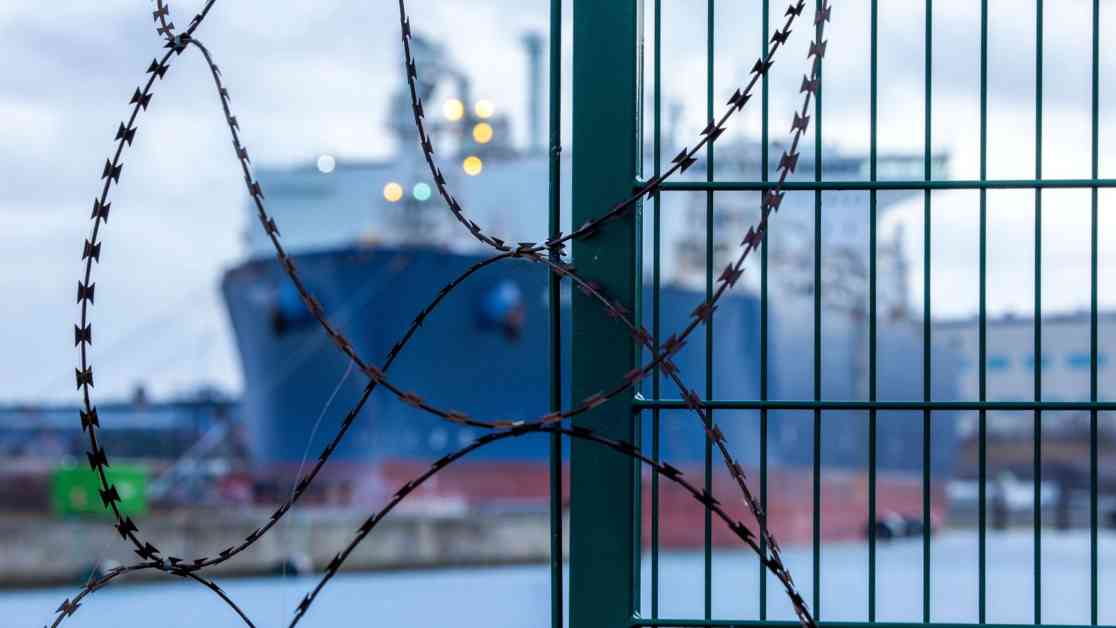The United Kingdom has taken a significant step in imposing sanctions on tankers transporting Russian gas, marking the first time such action has been taken since Russia’s invasion of Ukraine two and a half years ago. This move by the UK comes as part of efforts to increase pressure on Russia and curb its influence in the global energy market. The Foreign, Commonwealth and Development Office (FCDO) has announced the application of new powers to sanction five LNG tankers and two companies involved in the LNG sector.
Sanctioning tankers carrying Russian liquefied natural gas (LNG) is a strategic move by the UK to disrupt Russia’s energy exports, which are a key source of income for the country. The sanctions cover vessels that were previously insured by British companies but had their ties cut when they were sanctioned by the US. The FCDO is closely examining the possibility of imposing sanctions on other LNG tankers transporting Russian gas as well.
A recent report by Sky News highlighted the involvement of a company based in Glasgow, Seapeak, in owning and operating tankers carrying Russian gas from Siberia to Europe. Despite the sanctions, numerous LNG tankers are still insured by British companies, indicating the continued facilitation of these exports from Russia by British entities. This raises questions about the complicity of British companies in supporting Russia’s energy exports and the need for stricter measures to deter such activities.
The flow of LNG from Russia is a critical aspect of the country’s economy, providing significant revenue for both businesses and the government. With aspirations to increase its share of the global LNG market from 8% to 20%, Russia heavily relies on energy exports to sustain its economy. The sanctions imposed by the UK on tankers carrying Russian gas underscore the international pressure on Russia to comply with global standards and norms.
Challenges and Considerations
Sanctioning vessels involved in the transportation of Russian gas presents challenges for countries like the UK, as these tankers play a crucial role in supplying gas to Europe. While European countries have refrained from directly sanctioning Russian gas, the UK’s actions signal a shift in approach towards holding accountable those involved in facilitating Russia’s energy exports. The UK’s pivotal position in the shipping sector gives it leverage to influence and regulate the transportation of Russian gas to various destinations.
The effectiveness of sanctions on LNG tankers transporting Russian gas depends on international cooperation and coordination. As a critical player in the energy market, the UK must navigate the complexities of balancing economic interests with geopolitical considerations. The FCDO’s use of new powers to sanction individual vessels reflects a proactive stance in addressing the challenges posed by Russia’s energy exports and the role of British companies in facilitating them.
Impact on Global Energy Market
The imposition of sanctions on tankers carrying Russian gas could have ripple effects on the global energy market. Russia’s ambition to expand its share of the LNG market faces obstacles as countries like the UK take decisive actions to restrict the transportation of Russian gas. This move could lead to disruptions in supply chains and pricing dynamics, affecting both producers and consumers of LNG worldwide.
The UK’s sanctions on LNG tankers transporting Russian gas signal a broader effort to deter Russia’s aggressive actions and promote compliance with international norms. By targeting specific vessels and companies involved in the LNG sector, the UK aims to send a clear message that violations of international law and norms will not go unpunished. These sanctions contribute to the broader international efforts to hold Russia accountable for its actions and promote a rules-based global order.
In conclusion, the UK’s decision to impose sanctions on tankers carrying Russian gas represents a significant step in addressing the challenges posed by Russia’s energy exports. By utilizing new powers to target specific vessels and companies, the UK demonstrates its commitment to upholding international standards and promoting accountability in the energy sector. The impact of these sanctions on the global energy market remains to be seen, but they send a strong signal that actions contrary to international norms will have consequences.













